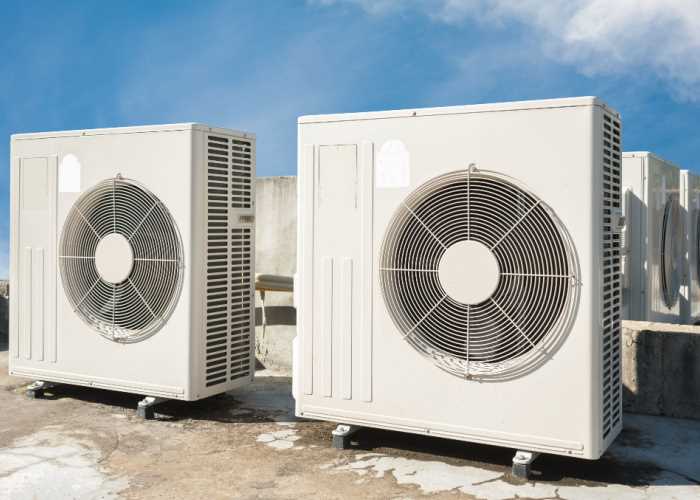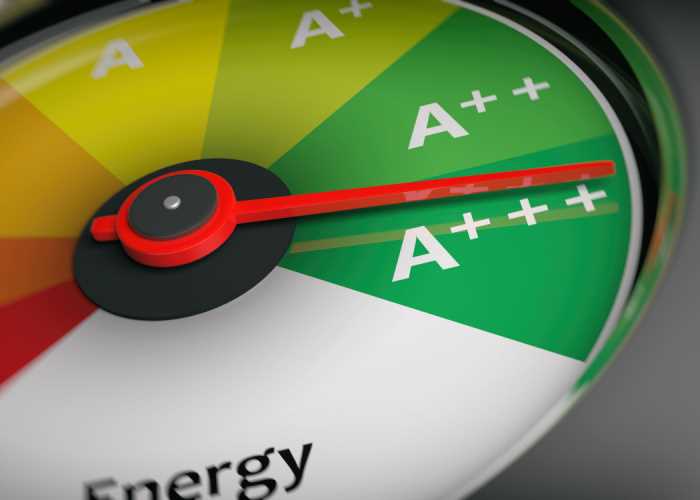Energy consumption is unavoidable in a commercial building. From powering essential equipment to maintaining comfortable working environments, businesses rely heavily on energy for many day-to-day activities.
However, as we work towards a more sustainable future, there’s a growing interest in the optimisation of energy usage and the adoption of eco-friendly practices.
When it comes to HVAC systems, there’s a number of innovative approaches and technologies that can be used to increase energy efficiency and reduce environmental impact.

Heat pumps are highly efficient devices that can both heat and cool spaces by transferring heat between indoor and outdoor environments.
Ground source heat pumps (GSHPs) harness the relatively constant temperature below the earth's surface. These systems transfer heat into buildings during the winter and expel heat during the summer through a network of buried pipes.
They are, however, costly and complex to instal, and only suited to locations where there’s sufficient space for the required ground loop.
Air source heat pumps (ASHPs), on the other hand, extract heat from the ambient air outside a building. They’re easier and faster to instal, with lower upfront costs, and can be located on walls, roofs and in tight spaces.
These versatile systems are a good option for smaller commercial buildings, and offer a substantial reduction in carbon emissions compared to traditional heating and cooling systems.
Proper air balancing is a crucial practice when optimising HVAC systems for sustainability. Carried out by professional HVAC technicians, this process involves adjusting dampers, fans and other components to achieve an even distribution of conditioned air throughout a building, preventing temperature variations and hot or cold spots.
This results in reduced energy consumption, lowering operational costs and contributing to more sustainable operation.
Air balancing is the last stage of the initial installation process, but it’s also recommended whenever there are changes to the building layout, occupancy patterns, or modifications to the HVAC system itself. Additionally, it should be performed periodically as part of routine maintenance, ensuring that the system continues to operate at peak efficiency.
Mechanical ventilation with heat recovery (MVHR) is a versatile technology that provides both ventilation and energy efficient temperature control.
These systems are designed to recover and reuse heat from exhaust air to preheat incoming fresh air, significantly reducing the reliance on additional heating. For example, if certain areas of a commercial building generate excessive heat - like kitchens or server rooms - MVHR systems can capture and redistribute this thermal energy to other zones in need.
By capturing and recycling energy that would otherwise be wasted, MVHR systems enhance energy efficiency and reduce the carbon footprint of HVAC systems.
Advanced Building Automation Systems (BAS) optimise the performance of HVAC equipment based on real-time conditions.
They work by collecting data from sensors distributed throughout the building, which monitor conditions such as temperature, humidity, occupancy, and outdoor weather. This real-time data is processed by the BAS controllers, which then adjust HVAC operation accordingly. For example, if a particular zone is unoccupied, the BAS may adjust the temperature or reduce ventilation rates to conserve energy.
These systems are expensive to instal, making them impractical for smaller commercial buildings. However, thanks to advancements in technology there are now more affordable and scalable Intelligent Building Management Systems (IBMS) available.
These offer a more practical solution for smaller businesses looking to automate energy efficiency and improve the sustainability of their HVAC systems.

Modern HVAC systems are built to run more efficiently, using advanced technologies like variable-speed motors and smart controls, so upgrading your HVAC equipment is a straightforward way to enhance sustainability.
You might look to upgrade your current system if it’s more than a decade old or if you notice a decline in performance, escalating operational costs, or difficulty in maintaining desired comfort levels.
While there is of course an initial upfront investment here, the long-term savings in energy costs and the positive environmental impact usually outweigh this.
Upgrading typically involves the decommissioning of older systems. This includes the safe removal and disposal of old equipment, ensuring that components are recycled or disposed of in an environmentally responsible manner.
Free cooling is an energy-efficient method employed in air conditioning systems to leverage external environmental conditions for cooling purposes. The basic principle involves drawing in outside air and directing it through the building's ventilation system.
This process is especially effective during cooler periods like evenings or certain seasons when the outdoor air temperature is lower than the desired indoor temperature, enabling the system to provide cooling without the need for energy-intensive refrigeration cycles.
For that reason, free cooling is well suited to settings like data centres and manufacturing facilities, where there’s a need for continuous, year round cooling.
By using the naturally lower ambient temperatures, free cooling introduces sustainable air conditioning methods, resulting in energy and cost savings.
Whether you’re looking to instal new, energy efficient equipment or make modifications to an existing system, Loughborough Air Conditioning can help.
We have over 20 years of experience in energy efficient HVAC design and would be happy to discuss your project requirements.
